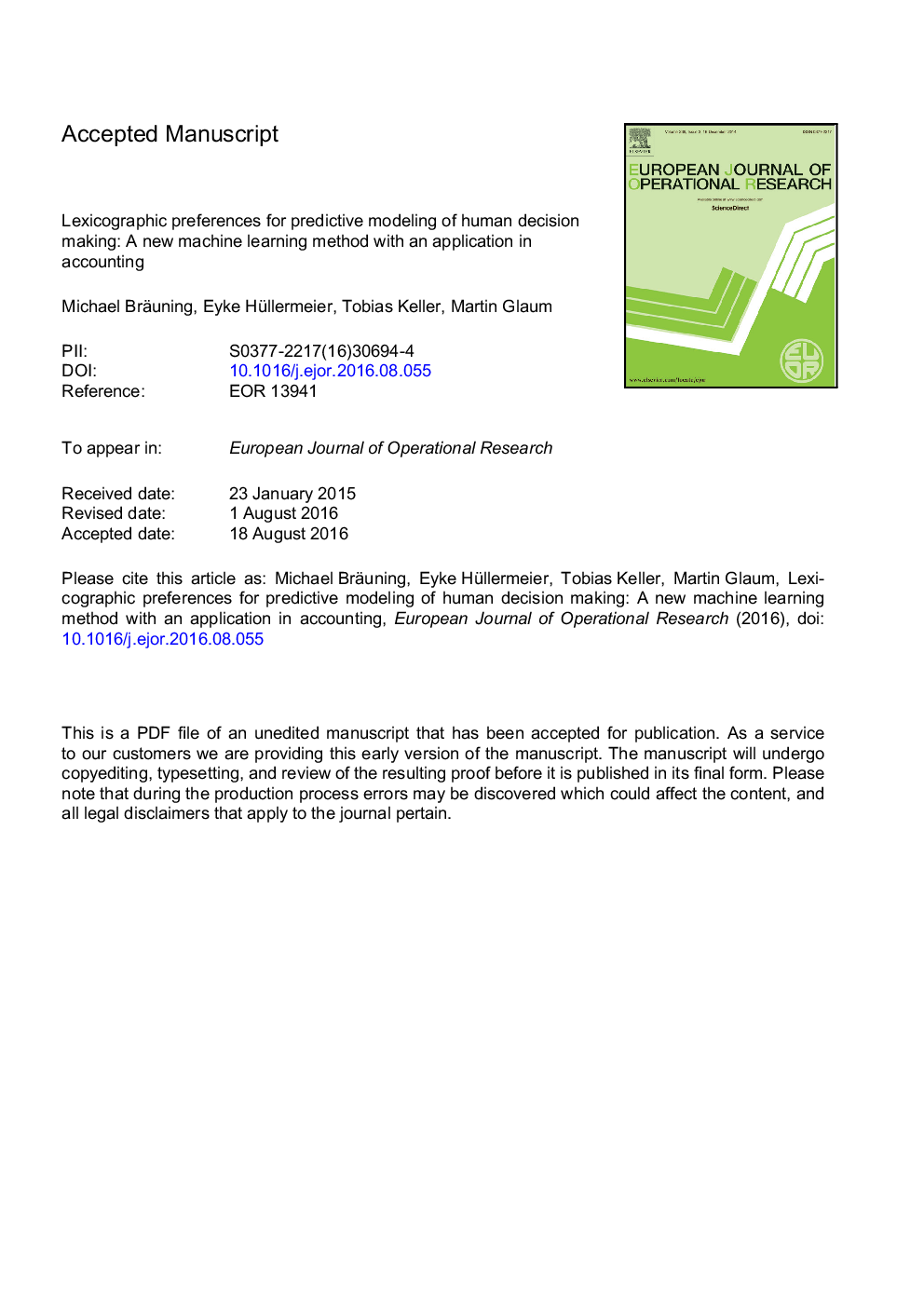| کد مقاله | کد نشریه | سال انتشار | مقاله انگلیسی | نسخه تمام متن |
|---|---|---|---|---|
| 4959969 | 1445963 | 2017 | 36 صفحه PDF | دانلود رایگان |
عنوان انگلیسی مقاله ISI
Lexicographic preferences for predictive modeling of human decision making: A new machine learning method with an application in accounting
ترجمه فارسی عنوان
ترجیحات واژگان برای مدل سازی پیش بینی تصمیم گیری انسان: یک روش یادگیری ماشین جدید با یک برنامه کاربردی در حسابداری
دانلود مقاله + سفارش ترجمه
دانلود مقاله ISI انگلیسی
رایگان برای ایرانیان
کلمات کلیدی
دستورالعمل لغوی ترجیح یادگیری، هوش مصنوعی، تجزیه و تحلیل تصمیم گیری، حسابداری،
ترجمه چکیده
ترجیحات واژگان در مجموعه ای از ویژگی ها ساختار شناختی قابل قبول را برای مدل سازی رفتار تصمیم گیران انسانی فراهم می کند. بنابراین، القاء مدل های مربوطه از ترجیحات نشان داده شده یا تصمیمات مشاهده شده یک مشکل جالب از دیدگاه یادگیری ماشین است. در این مقاله، یک الگوریتم یادگیری برای القا دادن مدل های ترجیحی واژگان تعمیم یافته از مجموعه داده های آموزشی ارائه شده است که شامل مقایسه های دوبعدی بین اشیاء است. رویکرد ما دستورالعملهای واژگانی ساده را به معنای اجازه دادن به مدل در نظر گرفتن ویژگیهای چندگانه به طور همزمان (به جای نگاه کردن به آنها به صورت یک به یک) تعمیم می دهد، که به طور قابل ملاحظه ای بیانگر کلاس مدل می شود. به منظور ارزیابی روش ما، ما یک مطالعه موردی از یک مسئله بسیار پیچیده دنیای واقعی یعنی انتخاب روش شناختی برای سود و زیان مشروط از طرح های بازنشستگی شغلی ارائه می دهیم. با استفاده از یک نمونه منحصر به فرد از شرکت های اروپایی، این مشکل برای نشان دادن اثربخشی رتبه بندی لغوی ما مناسب است. علاوه بر این، ما مجموعه ای از آزمایشات بر روی داده های معیار از دامنه یادگیری ماشین انجام می دهیم.
موضوعات مرتبط
مهندسی و علوم پایه
مهندسی کامپیوتر
علوم کامپیوتر (عمومی)
چکیده انگلیسی
Lexicographic preferences on a set of attributes provide a cognitively plausible structure for modeling the behavior of human decision makers. Therefore, the induction of corresponding models from revealed preferences or observed decisions constitutes an interesting problem from a machine learning point of view. In this paper, we introduce a learning algorithm for inducing generalized lexicographic preference models from a given set of training data, which consists of pairwise comparisons between objects. Our approach generalizes simple lexicographic orders in the sense of allowing the model to consider several attributes simultaneously (instead of looking at them one by one), thereby significantly increasing the expressiveness of the model class. In order to evaluate our method, we present a case study of a highly complex real-world problem, namely the choice of the recognition method for actuarial gains and losses from occupational pension schemes. Using a unique sample of European companies, this problem is well suited for demonstrating the effectiveness of our lexicographic ranker. Furthermore, we conduct a series of experiments on benchmark data from the machine learning domain.
ناشر
Database: Elsevier - ScienceDirect (ساینس دایرکت)
Journal: European Journal of Operational Research - Volume 258, Issue 1, 1 April 2017, Pages 295-306
Journal: European Journal of Operational Research - Volume 258, Issue 1, 1 April 2017, Pages 295-306
نویسندگان
Michael Bräuning, Eyke Hüllermeier, Tobias Keller, Martin Glaum,
